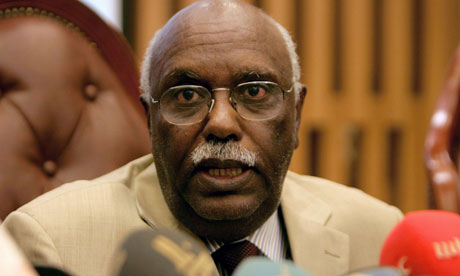 |
| "Rahma Mohammed Osman, Sudanese undersecretary of foreign affairs, pictured after Sudan's parliament called a halt to negotiations with South Sudan." (Ashraf Shazly/AFP/Getty Images) |
By Simon Tisdall
The Guardian, April 18, 2012
"Sudan burns -- and the world yawns. Clashes along the north-south border multiply and spread, presaging all-out war -- and the UN talks vaguely of new sanctions. Khartoum's parliament brands newly independent South Sudan an 'enemy', oil wells burn, civilians are bombed, a humanitarian emergency looms -- and Thabo Mbeki, the African Union's forlorn mediator, suggests there is not much he can do. In the order of global business, it seems Sudan does not rate highly. This is odd, given the massive effort the US, Britain, and other guarantors put into securing the 2005 Comprehensive Peace Agreement (CPA) that ended 22 years of civil war. The deal was loudly applauded at the time, leading directly to last year's southern secession. But its loose ends, principally over border demarcation and oil sharing, may be its undoing. Both countries say they remain committed to peace. Neither can afford another conflict. But in Mbeki's words, they are trapped in the 'logic of war'. Expressions of alarm are not in short supply following the provocative occupation by southern forces last week of the oil-producing Heglig region of South Kordofan state. The UN secretary-general, Ban Ki-moon, called for an immediate halt to hostilities. Egypt has tried in vain to bring the two sides together. China, which will host South Sudan's president Salva Kiir this month, seeks a resumption of suspended oil output. Even Iran, ostensibly playing the good guy though doubtless eyeing Israeli support for the Juba government, has called for calm. But Kiir, like his opposite number in Khartoum, President Omar al-Bashir, is acting stubborn, drawing on decades of mutual distrust, bad faith and bloody-mindedness while casting aside more recent pledges of amity. Kiir complained last week, in a boastful sort of way, that he could not sleep for all the phone calls he was getting. 'Those who have been calling me starting with the UN secretary-general, he gave me an order that I'm ordering you to immediately withdraw from Heglig. I said I'm not under your command,' Kiir said. For his part, Bashir told Egypt's foreign minister he would resume negotiations only after southern forces left Heglig (which produces half of Sudan's oil). According to the official Sudan news agency, Bashir said Sudan reserved the right to respond to the occupation of Heglig 'in any manner that guarantees its security, sovereignty and stability'. That was a clear hint that a big counter-offensive could be in the making. And for once at least, Bashir has a modicum of western understanding, if not sympathy. [...]"
No comments:
Post a Comment
Please be constructive in your comments. - AJ